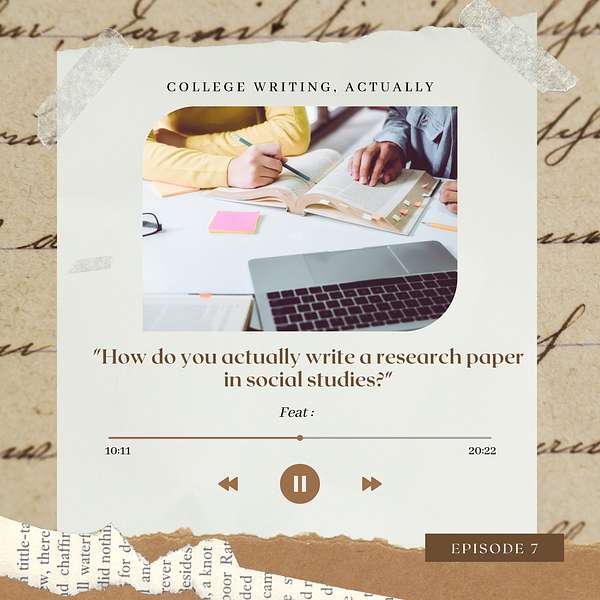
College Writing, Actually
College Writing, Actually
"How Do You Actually Write A Paper in the Social Sciences?"
Use Left/Right to seek, Home/End to jump to start or end. Hold shift to jump forward or backward.
We've finally come to the final episode of our trilogy on writing in the disciples! Today I'm joined by Dr. Dana Hayward who's gonna walk us through how to write a paper in the social sciences. Grab that paper and pen!
Appreciate the resources the podcast provides? Consider becoming a monthly subscriber. Choose how much you want to give with pledges starting at $3/month-- cancel anytime. Because everyone deserves writing resources. Make a no-strings-attached pledge here: https://www.buzzsprout.com/2097929/supporters/new
HANDOUT: WRITING EFFECTIVE RESEARCH QUESTIONS
Dana Hayward
I. Strategies
How vs. Why Questions
The burden of proof is higher with a ‘why’ question, because it’s committing you to explaining a causal relationship. A ‘how’ question allows you to explain or illustrate relationships between concepts without necessarily needing to speak to causality.
Scope
Ideally, your research question should be broad enough to appeal to a wide audience, but also narrow enough to be answered in the space provided. The research question for a book length study will be bigger than the question for a journal article, which will be bigger than the question for a term paper. Sometimes, it can be helpful to follow up a broad research question with a
more specific one about your case and/or method.
For example, in my paper on sex work and stigma, I asked: “How does decriminalization affect the social meaning of sex work? More specifically, how did the passage of New Zealand’s Prostitution Reform Act influence the stigmatization of sex work? How were sex work and sex workers portrayed in major newspapers prior to the adoption of the Act, and how were they portrayed following the passage of this law?” The first question is the big hook, designed to appeal to broad audiences in sociology of sex work, sociology of gender, and sociology of law. The second question introduces my empirical case study: New Zealand’s Prostitution Reform Act. The third question introduces my method: media analysis of print newspapers.
Noun Choice
Your nouns set the parameters of your research study, so be specific and precise. “Secondary schools” means something different than “the educational system” or “education”, so think carefully about which nouns work best for your study.
Verb Choice
Pay attention to the verbs you use in your research question: “determine” is a much stronger verb than “affect”, “influence”, or “shape”. Avoid “prove” altogether.
Active vs. Passive
The passive voice (“How is Y shaped by X?”) weakens your writing. You should write your research questions in the active voice (“How does X shape Y?”)
II. Examples
These examples are all drawn from articles published in the three most recent issues of Gender and Society, the top ranked sociology of gender journal. These research questions aren’t necessarily “perfect”, but they’re good examples of the points above.
“How do queer people negotiate culturally dominant gendered dating and courtship practices? (Lamont, Ellen. "“We Can Write the Scripts Ourselves”: Queer Challenges to Heteronormative Courtship Practices." Gender & Society (2017): 0891243217723883)
“How has scholarship on gender in the sociology of religion changed over time? What does this tell us about the production of feminist knowledge?” (Avishai, Orit, and Courtney Ann Irby. "Bifurcated Conversations in Sociological Studies of Religion and Gender." Gender & Society 31, no. 5 (2017): 647-676.)
“How do the practices of Danish secure care institutions produce gendered vulnerabilities and marginalization for the girls placed i
